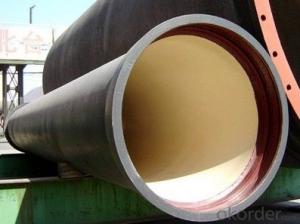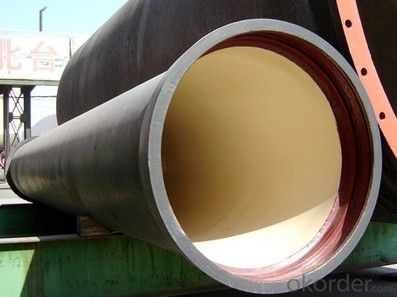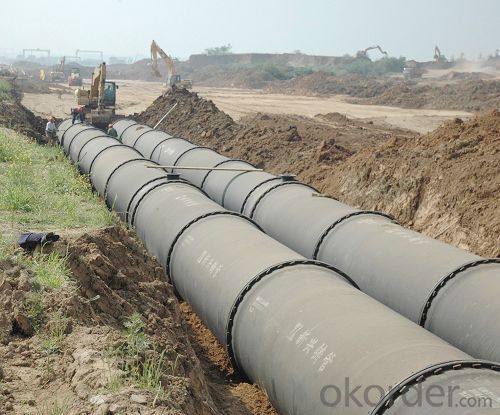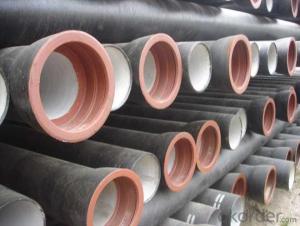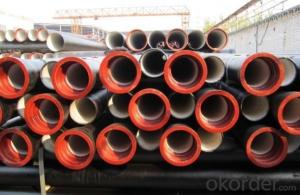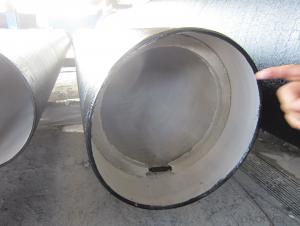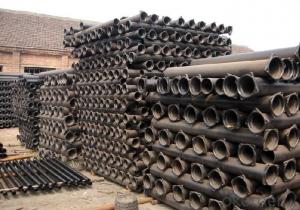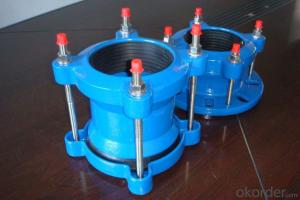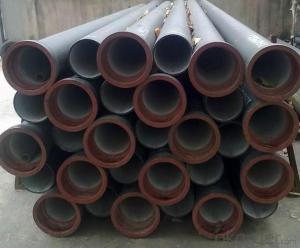Ductile Iron Cast Iron Pipe EN598 DN300 On Sale
- Loading Port:
- China main port
- Payment Terms:
- TT OR LC
- Min Order Qty:
- 999 m
- Supply Capability:
- 9999 m/month
OKorder Service Pledge
OKorder Financial Service
You Might Also Like
1,Ductile Iron Pipe Description :
1) Pipes confirm to ISO2531,K9 class,T type joint,6m long,with inside cements lining conform to ISO4179, outside Zinc spraying(130g/m2) and bitumen coating(70μm) conform to ISO8179.
2) Pipe ends: Spigot and socket ends, with 100% SBR rubber gaskets accoding to ISO4633
3) we can do third party inspection according to customer's request.
4) Our products have been sold to many international market, such as Middle East and South East Asia and Africa.
2,Main Features of the Ductile Iron Pipe:
•High yield strength
•High tensile Strength
•High corrosion resistance
•Pressure Resistence
Test: In accordance with ISO 2531 / EN 545 / EN598 and 100% water pressure test
Length: 6m or cut into 5.6m, 5.7m, 5.8m
Internal Lining: Cement, conform to ISO4179
External coating: Zinc + Bitumen, conform to ISO8179
Rubber: NBR, SBR, EPDM according to ISO4633 / EN681.1
Note: The gaskets, bolts & nuts are supplied respectively as your special requirement
3,Ductile Iron Pipe Images:
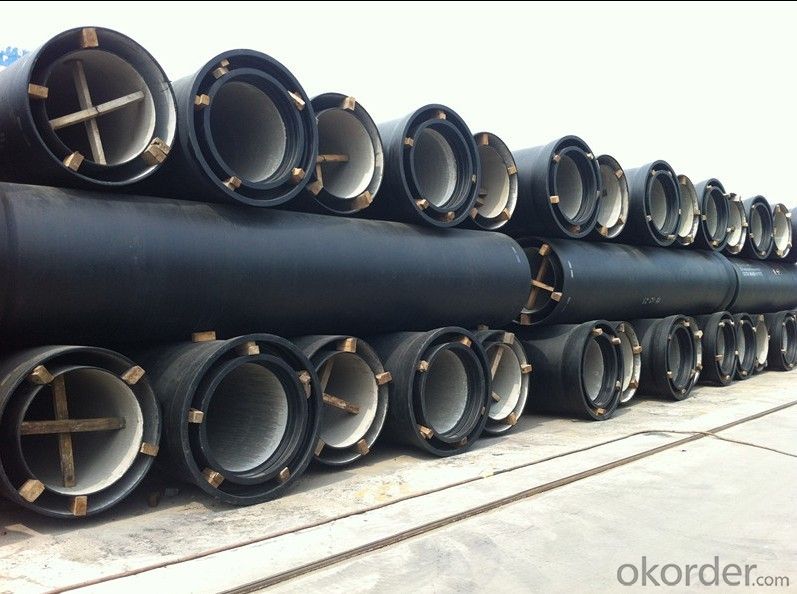
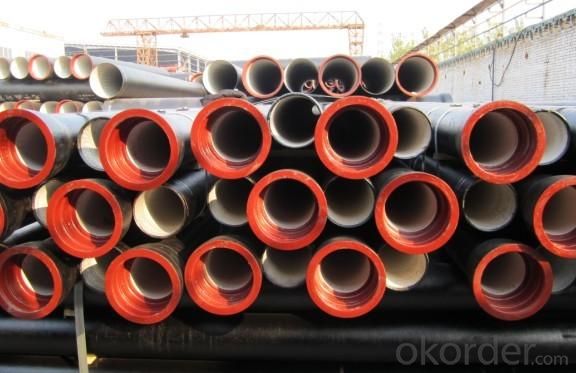
4. Ductile Iron Pipe Specification
Standard: API SPEC 5L 44th eidtion,ASTM A252-98(2007)
Grade: A53 Grades A/B, ASTM A106 Grades B/C,ASTM A179
AWWA, C200, ASTM A139, ASTM A120, API 5L Grade B
X42, X52, X56, X60, X65, X70, X80, X100
Weld Alternatives: LSAW
OD size range: 6.4~44.5mm
Wall thickness: 406.4~1422mm
Length: 3 - 12 m according to requirment
Note: Other grade can also be provided after consulting. Special design are available
for coal slurry conveyance LSAW line tube -- Service
Specifications
Subsidiary of Forbes Fortune 500 company (Ranking 485th in 2011). Provides full rang of ductile iron pipes with finest quality.
5.FAQ:
We have organized several common questions for our clients,may help you sincerely:
1.Q: Why would you choose ductile iron pipe rather than other pipe materials?
A:The reasons are obvious for that not only ductile iron pipe possesses the inherent strength and flexibility of ductile iron, combined with proven corrosion protection systems, but also the cost savings can be achieved from design to installation and commissioning.
2.Q:Why can you guarantee the inner of pipes can’t be corroded?
A: High alumina cement mortar lining and sulphate-resistant cement mortar lining. These two special linings are applicable to inner anti-corrosion for sewage pipes, improving resistance to erosion of the sewage components.
- Q: Are ductile iron pipes suitable for installation in areas with high groundwater salinity?
- Areas with high groundwater salinity are generally suitable for the installation of ductile iron pipes. Ductile iron is renowned for its resistance to corrosion, making it a favored choice for various applications, such as water and wastewater systems. High groundwater salinity refers to the increased presence of dissolved salts in the water. Although this can potentially cause corrosion in certain materials, ductile iron pipes are specifically engineered to withstand such conditions. These pipes are equipped with a protective lining, usually composed of cement mortar or polyurethane, which acts as a barrier between the pipe and its surroundings, including highly saline water. The lining serves to prevent any corrosive effects of the high groundwater salinity on the iron pipe, ensuring its long-lasting durability and reliability. Furthermore, ductile iron pipes possess a high tensile strength, enabling them to endure external loads and pressure, even in demanding environments. It is important to acknowledge that the suitability of ductile iron pipes for areas with high groundwater salinity can also be influenced by factors such as the specific levels of salinity, the presence of other corrosive agents, and the overall design and installation practices. Therefore, it is advisable to consult experts or engineers who are familiar with the local conditions in order to determine the most appropriate materials and precautions for specific installation projects.
- Q: What is the maximum allowable joint deflection for ductile iron pipes?
- The maximum allowable joint deflection for ductile iron pipes is typically specified by industry standards and guidelines. These standards may vary depending on the specific application and local regulations. In general, the maximum allowable joint deflection for ductile iron pipes is usually limited to a range between 1% to 5% of the pipe diameter. This means that the pipe can typically tolerate a deflection of up to 1% to 5% of its diameter without causing any significant damage or compromising its structural integrity. However, it is important to note that the exact maximum allowable joint deflection may vary depending on factors such as pipe size, wall thickness, and operating conditions. It is recommended to consult the relevant industry standards, such as those published by the American Water Works Association (AWWA) or the International Organization for Standardization (ISO), for specific guidelines on maximum allowable joint deflection for ductile iron pipes in a given application.
- Q: Method for joining cast iron pipes
- The connection between the pipe and the pipe adopts the form of socket type or flange disk interface. According to the function, it can be divided into two kinds: flexible interface and rigid interface. The flexible interface is sealed with rubber ring, which allows a certain degree of corner and displacement, so it has good seismic resistance and tightness. It is easy and quick to install than rigid interface. It has little labor intensity according to the casting method.
- Q: What are the typical joint sealing requirements for ductile iron pipes?
- When sealing joints in ductile iron pipes, two common methods are typically used: rubber gaskets and mechanical joints. Rubber gaskets are frequently chosen for their reliability and flexibility. They are typically made of synthetic rubber materials that are resistant to water, chemicals, and other environmental factors. On the other hand, mechanical joints are also commonly used for sealing joints in ductile iron pipes. These joints utilize a mechanical device to connect the pipes and create a watertight seal. They are designed to allow for some movement and flexibility, which is particularly important in areas prone to ground movement or settlement. In addition to using rubber gaskets or mechanical joints, it is crucial to properly clean and prepare the pipe surfaces before joining them. This involves removing any dirt, debris, or old joint material from the pipe ends to ensure a secure seal. Following the manufacturer's instructions, the joint should be assembled, ensuring that the gasket or mechanical joint is correctly positioned and tightened to the recommended torque. In summary, the typical requirements for sealing joints in ductile iron pipes involve the use of rubber gaskets or mechanical joints, thorough cleaning and preparation of the pipe ends, and adherence to the manufacturer's assembly instructions. These requirements are essential to achieve a durable and watertight joint that can withstand the pressures and environmental conditions commonly encountered in ductile iron pipe systems.
- Q: Are ductile iron pipes suitable for use in hydroelectric dams?
- Hydroelectric dams benefit from the suitability of ductile iron pipes. Ductile iron, a more flexible and stronger type of iron compared to traditional cast iron, is an ideal option for various applications, including water transmission systems in hydroelectric dams. Ductile iron pipes possess durability and resistance to corrosion, which is essential in the continuous water exposure environment of a dam. They can endure high pressures and extreme temperatures, making them fitting for the demanding conditions within hydroelectric dams. Moreover, ductile iron pipes exhibit excellent joint integrity, guaranteeing their leak-proof and reliable performance throughout their lifespan. This aspect is crucial for maintaining the efficiency and effectiveness of a hydroelectric dam's water transmission system. Additionally, ductile iron pipes prove to be cost-effective when compared to materials like steel or concrete. With a long service life, minimal maintenance requirements, and easy availability, they present a practical choice for hydroelectric dam projects. In conclusion, ductile iron pipes are a viable option for hydroelectric dams due to their durability, corrosion resistance, high-pressure tolerance, joint integrity, and cost-effectiveness. They provide the necessary strength and flexibility to efficiently transport water within the dam, contributing to the overall success and longevity of the hydroelectric power generation system.
- Q: Are ductile iron pipes suitable for use in hydropower projects?
- Indeed, ductile iron pipes prove to be a suitable option for implementation in hydropower projects. Possessing a remarkable tensile strength and corrosion resistance, these pipes emerge as the ideal choice for applications in hydropower projects where water flow and pressure play a significant role. Demonstrating the ability to endure high pressure and boasting durability, these pipes guarantee long-term reliability and safety within hydropower systems. Furthermore, when compared to alternative materials such as steel, ductile iron pipes present a cost-effective solution, rendering them a favored selection for hydropower projects. In summary, ductile iron pipes possess the essential characteristics and performance qualities necessary to meet the rigorous conditions encountered in hydropower projects.
- Q: How do ductile iron pipes handle internal scale buildup?
- Ductile iron pipes are highly resistant to internal scale buildup due to their smooth inner surface. The material's inherent strength and durability allow it to withstand the pressure exerted by scale deposits without significant damage or reduced performance. Additionally, the smooth surface of ductile iron pipes minimizes the adhesion of scale, preventing its accumulation and ensuring efficient flow of water or other fluids. Regular maintenance and periodic cleaning can further enhance the longevity and performance of ductile iron pipes in managing any potential scale buildup.
- Q: What do ductile iron pipes need to connect with three? Can I contact it directly?
- Because the interface material used in the old process is poisonous, especially in the water supply pipeline, environmental protection requires a new process now
- Q: Can ductile iron pipes be used for dam construction?
- Yes, ductile iron pipes can be used for dam construction. Ductile iron pipes are known for their durability, strength, and corrosion resistance, making them suitable for various applications including dam construction. These pipes can withstand high pressure and are capable of handling the water flow required for dam operations. Additionally, their flexibility allows for easy installation and maintenance, making them a viable choice for constructing dams.
- Q: Are ductile iron pipes compatible with other pipe materials?
- Yes, ductile iron pipes are generally compatible with other pipe materials. Ductile iron pipes have a high level of flexibility and strength, making them suitable for connecting with different pipe materials such as PVC, HDPE, and steel. Transition fittings are commonly used to connect ductile iron pipes to other materials, ensuring a secure and leak-free joint. It is important to adhere to industry standards and guidelines when connecting different pipe materials to ensure compatibility and maintain the integrity of the pipeline system.
Send your message to us
Ductile Iron Cast Iron Pipe EN598 DN300 On Sale
- Loading Port:
- China main port
- Payment Terms:
- TT OR LC
- Min Order Qty:
- 999 m
- Supply Capability:
- 9999 m/month
OKorder Service Pledge
OKorder Financial Service
Similar products
Hot products
Hot Searches
Related keywords
